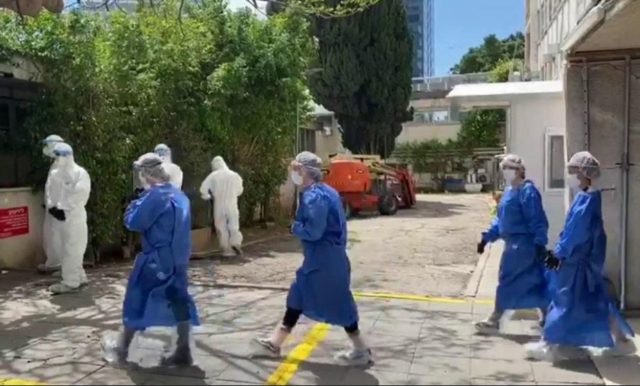Prof. Eli Wachsman from Weizmann Institute tells Ynet if the government doesn’t take urgent precautionary steps to combat the epidemic, the country faces another nationwide lockdown; says in 50% of the cases, staff cannot trace the source of infection

Coronavirus Medical teams wearing protective gear entering a coronavirus ward at the Ichilov Medical Center in Tel Aviv (Photo Ichilov PR)
Israel has lost control over the ongoing coronavirus outbreak as the disease resurges in the country, a former government advisor on the epidemic said on Sunday.
Prof. Eli Wachsman from Weizmann Institute, who headed the team of medical advisors to the National Security Council at the start of the outbreak, said the Health Ministry and the government must take immediate precautionary measures in order to prevent another nationwide lockdown in the coming weeks.
In an interview with Ynet, Prof. Wachsman proposed two courses of action the government can take to avoid another round of massive closures.
“The first step is minimizing the rate of infection by initiating nation-wide enforcement measure to ensure social distancing in public places,” said Prof. Wachsman. “This could be done by banning social gatherings larger than several dozen people. In our current state, delaying this step could have a heavy cost down the line,” he added.
“The second step is to transfer the authority to oversee the epidemic from the operative bodies in the Health Ministry and the public health system to an emergency unit, set to be established within the ministry,” he added.
He warned that if these steps will not quickly be implemented and the handling of the crisis continues as it is now, Israel is in danger of going into another nationwide lockdown in three to four weeks’ time.
“If we take these steps now,” he said, “we will eliminate this danger [nation-wide lockdown], with the main benefactors being the economy and the country’s finances.”
Prof. Wachsman said there are two reasons why the country lost control over the outbreak.
“Firstly, we lifted restrictions too early,” he said. “Secondly, we did not build a mechanism to prevent local outbreaks by cutting them off at the source.”
According to him, there are flaws with the way medical officials conduct testing and subsequent epidemiological investigations.
“We have the tools to do this, the problem is management,” he said. “The issue is this whole process isn’t goal-based – quantitative metrics that would allow us to determine how good we are at performing the tasks.”
“We are far from the target of identifying a patient those who were in contact with him, in 48 hours,” he added, referring to Prime Minister Benjamin Netanyahu’s order to cut the time of epidemiological investigations.
He said that in 50% of the cases, the medical staff cannot trace the source of infection. “It shows we are inefficient in stopping the spread.”
Another 397 people tested positive for coronavirus on Saturday, with the infection rate jumping to highest since the peak of the epidemic in Israel, health officials confirmed.
The Coronavirus National Information and Knowledge Center reported on Sunday that despite the low overall number of infected, with 9,725 COVID-19 tests conducted, the latest sick tally represents a worrying 4% contagion rate.
The death toll from coronavirus-related complications has risen to 318, with the number of patients requiring hospitalization now stands at 212.
Adir Yanko, Alexandra Luka, Ynet News
Read more about: Coronavirus, COVID-19, Pandemics



